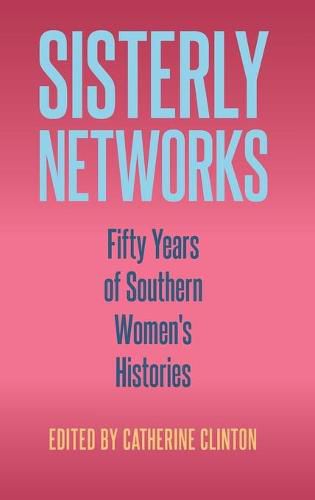Readings Newsletter
Become a Readings Member to make your shopping experience even easier.
Sign in or sign up for free!
You’re not far away from qualifying for FREE standard shipping within Australia
You’ve qualified for FREE standard shipping within Australia
The cart is loading…






This title is printed to order. This book may have been self-published. If so, we cannot guarantee the quality of the content. In the main most books will have gone through the editing process however some may not. We therefore suggest that you be aware of this before ordering this book. If in doubt check either the author or publisher’s details as we are unable to accept any returns unless they are faulty. Please contact us if you have any questions.
Tracing the development of the field of southern women’s history over the past half century, Sisterly Networks shows how pioneering feminists laid the foundation for a strong community of sister scholars and delves into the work of an organization central to this movement, the Southern Association for Women Historians (SAWH).Launched in 1970, the SAWH provided programming, mentoring, fundraising, and outreach efforts to support women historians working to challenge the academic establishment. In this book, leading scholars reflect on their own careers in southern history and their experiences as women historians amid this pathbreaking expansion and revitalization of the field. Their stories demonstrate how women created new archival collections, expanded historical categories to include gender and sexuality, reimagined the roles and significance of historical women, wrote pioneering monographs, and mentored future generations of African American women and other minorities who entered the academy and contributed to public discourse.
Providing a lively roundtable discussion of the state of the field, contributors comment on present and future work environments and current challenges in higher education and academic publishing. They offer profound and provocative insights on the ways scholars can change the future through radically rewriting the gender biases of recorded history.
$9.00 standard shipping within Australia
FREE standard shipping within Australia for orders over $100.00
Express & International shipping calculated at checkout
This title is printed to order. This book may have been self-published. If so, we cannot guarantee the quality of the content. In the main most books will have gone through the editing process however some may not. We therefore suggest that you be aware of this before ordering this book. If in doubt check either the author or publisher’s details as we are unable to accept any returns unless they are faulty. Please contact us if you have any questions.
Tracing the development of the field of southern women’s history over the past half century, Sisterly Networks shows how pioneering feminists laid the foundation for a strong community of sister scholars and delves into the work of an organization central to this movement, the Southern Association for Women Historians (SAWH).Launched in 1970, the SAWH provided programming, mentoring, fundraising, and outreach efforts to support women historians working to challenge the academic establishment. In this book, leading scholars reflect on their own careers in southern history and their experiences as women historians amid this pathbreaking expansion and revitalization of the field. Their stories demonstrate how women created new archival collections, expanded historical categories to include gender and sexuality, reimagined the roles and significance of historical women, wrote pioneering monographs, and mentored future generations of African American women and other minorities who entered the academy and contributed to public discourse.
Providing a lively roundtable discussion of the state of the field, contributors comment on present and future work environments and current challenges in higher education and academic publishing. They offer profound and provocative insights on the ways scholars can change the future through radically rewriting the gender biases of recorded history.